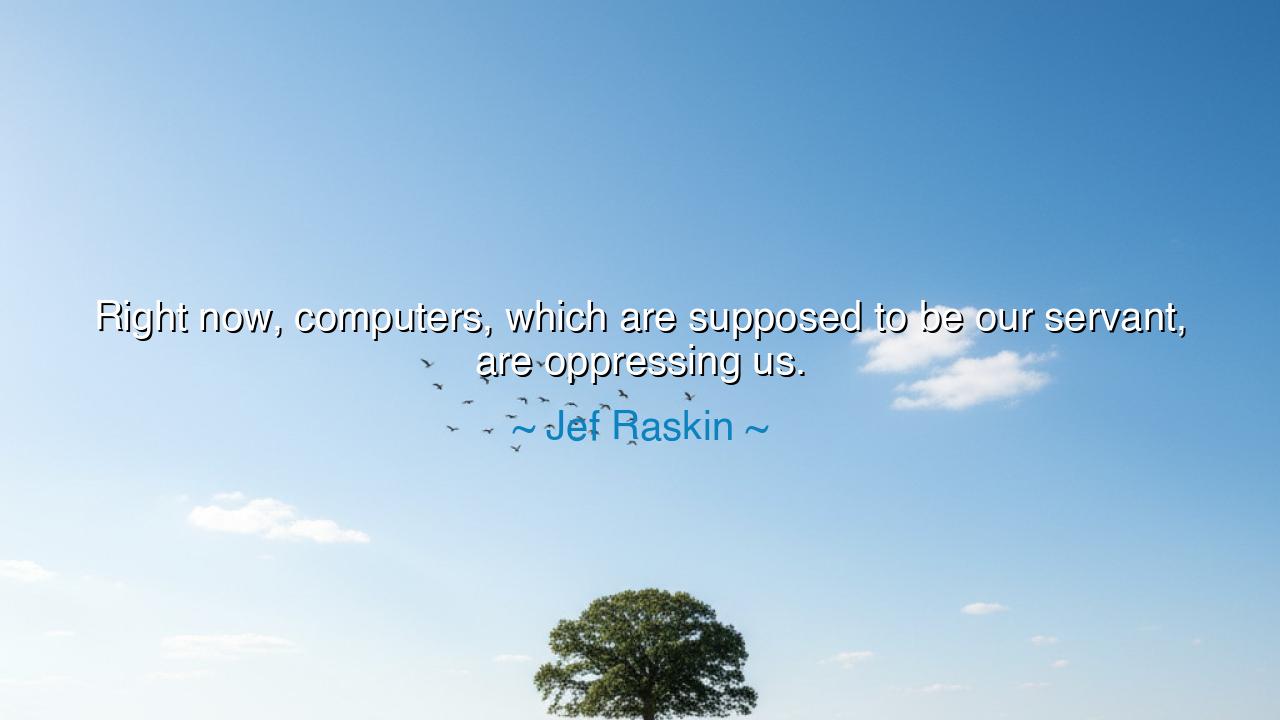
Right now, computers, which are supposed to be our servant, are






Jef Raskin’s words, “Right now, computers, which are supposed to be our servant, are oppressing us,” speak to a profound truth about the relationship between humanity and the very tools we have created to serve us. In this evocative statement, Raskin highlights the irony of the modern world: the machines we designed to simplify our lives have, in many ways, become a source of stress, complexity, and frustration. Instead of being our servants, helping us with tasks and challenges, computers and technology have started to control us, dictating the rhythm of our lives and demanding our constant attention. The promise of technology was that it would free us from the burdens of labor and organization, yet for many, it has become an overwhelming force that enslaves our time and energy.
In the ancient world, the relationship between man and tools was one of balance and control. The Greeks understood the value of technology, but they also cautioned against overreliance on tools that could take away from our human essence. Aristotle warned that while tools can enhance our capabilities, they must always be used in service of human flourishing. He believed that the purpose of all tools and innovations was to allow individuals to live better, to reflect, and to grow in wisdom, not to become enslaved by them. In much the same way, Raskin’s critique of modern computers mirrors the ancient wisdom that technology must serve humanity, not overwhelm it.
Consider the story of Prometheus, the Titan who defied the gods to bring fire to humanity. Fire, a powerful tool, enabled the early humans to cook, warm themselves, and create civilization. However, just as fire can be used to create, it can also destroy. Prometheus’ gift, while a boon to humankind, also led to the wrath of the gods and to unforeseen consequences. This myth serves as a metaphor for the dangerous duality of technology—while it has the potential to empower and liberate, it can also overwhelm and enslave if not used wisely. Today, computers are much like fire—powerful and transformative, but capable of becoming oppressive if we are not careful in how we wield them.
The ancients also warned about the loss of control in the face of over-indulgence. The great philosopher Socrates cautioned against living a life of excessive desire for material things. In his dialogue Phaedo, Socrates discusses how the soul can become enslaved to the body and to pleasure, losing sight of the higher truths. Similarly, in today’s world, we have become enslaved by the very technologies we created. Our dependence on computers, smartphones, and digital devices has led to an endless cycle of notifications, distractions, and demands on our time. Instead of being tools for enhancement, these devices often consume us, taking us away from the pursuit of deeper reflection and personal growth.
This dynamic of technology becoming oppressive is evident in the very design of our modern digital world. Social media, for example, has become a double-edged sword—an amplifier of connection and creativity, but also a trap of comparison, anxiety, and distraction. The endless scrolling, the perpetual notifications, and the need for validation can create a cycle of dependency, where the user feels compelled to engage constantly, rather than choosing when and how to connect meaningfully. Raskin’s critique of computers touches on this phenomenon—how the very tools meant to connect us can, in fact, disconnect us from the most important aspects of life: meaningful relationships, deep reflection, and self-knowledge.
The ancient Stoics, such as Marcus Aurelius and Epictetus, taught that control over one's mind was the key to peace and happiness. For the Stoics, the external world—including all tools and technologies—was a source of potential distraction and discomfort unless it was viewed with wisdom and self-restraint. They believed that a true sage was one who could navigate life’s challenges without becoming overwhelmed by external circumstances. The Stoic emphasis on internal strength and self-mastery speaks directly to Raskin’s warning: if we lose control over the technologies we create, we risk becoming enslaved by them. True freedom, according to the Stoics, comes not from relying on external devices, but from cultivating a mind that is self-sufficient and focused on what is truly important.
Lesson for the ages:
The tools we create—whether fire, computers, or social media—are powerful, but their power is only useful when guided by wisdom and awareness. The ancients understood that technology, when used in service of humanity, could uplift and empower, but when left unchecked, it could easily become a source of oppression. We must remember that technology is not an end in itself; it is a tool to be used for human flourishing. Like Prometheus bringing fire, we must ensure that we control the tools we create, rather than allowing them to control us.
Practical Action:
In your daily life, take time to reflect on the role that technology plays in your world. Use it as a tool for growth, connection, and creativity, but do not let it consume you. Practice discipline in your use of devices—limit distractions, control your engagement, and use technology mindfully. Just as the ancients taught us to balance our desires with reason, so must we balance our use of technology with our deeper need for reflection, personal growth, and human connection. Embrace the tools of today, but always remember that they are meant to serve you, not enslave you.






AAdministratorAdministrator
Welcome, honored guests. Please leave a comment, we will respond soon